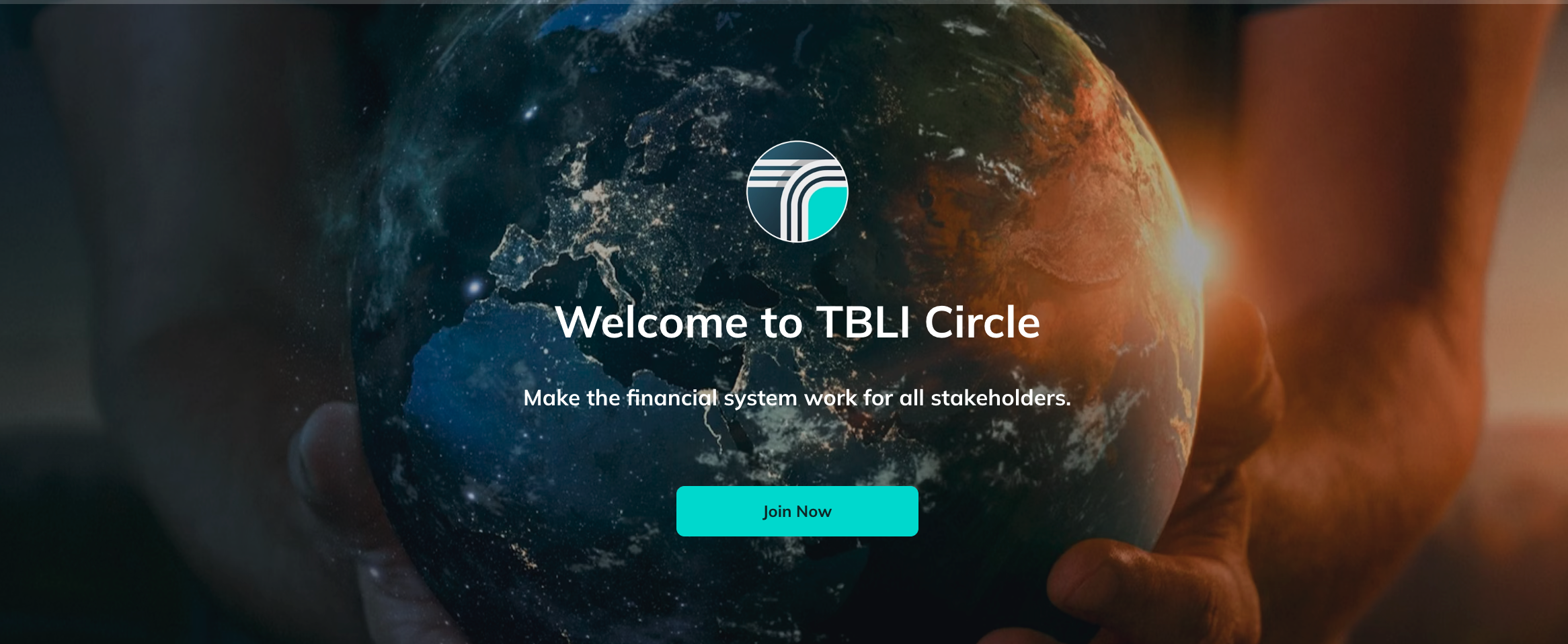
Your weekly guide to Sustainable Investment
TBLI Radical Truth Podcast
'Maximizing Impact with Sustainable Returns' with John A. Simon
Welcome to TBLI Talk, where knowledge inspires and finance meets purpose.
In this episode, we’re joined by John A. Simon, a seasoned investor, diplomat, and leader in sustainable development who has dedicated his career to bridging impact and financial performance.
In “Maximizing Impact with Sustainable Returns,” John unpacks how investors can align capital with solutions that deliver both measurable social progress and strong financial outcomes. Drawing on his experience in private equity, international development, and public service, he shares practical insights on how to design investment strategies that create long-term value for people, planet, and portfolios alike.
From mobilizing private capital for development, to building impact-focused institutions, John brings decades of perspective on what it takes to make sustainability not just an aspiration—but a disciplined, investable reality.
Listen to the full podcast
TBLI Virtual Mixer

TBLI Virtual Mixer Speed networking with values-aligned peers.
Our matchmaking system connects you No fluff. No travel. Just real, purpose-driven conversations.
Limited space — join early!
TrustVC
.jpg)
What if founders could rate investors, and LPs could spot red flags early? That’s the idea behind TrustVC.org, a new TBLI Group initiative bringing sunlight to startup funding. Why it matters:
Too many founders get ghosted. Too many LPs find out too late. TrustVC changes that by: Letting founders review VCs and PE firms Helping LPs identify trusted fund managers Highlighting fair, founder-friendly investors
How to support:
✅ Share TrustVC with your network
✅ Encourage founders to post reviews
✅ Add any missing firms
Just launched: TrustVC.org — the investor review platform VCs never wanted, but founders always needed.
If you’ve worked with investors, please leave a review or add a firm. Let’s bring some sunlight to startup funding
Join TBLI Circle — Where Purpose Meets Real Connection

Tired of empty buzzwords, extractive networks, or “impact” without substance? TBLI Circle is your alternative.
This isn’t just another platform. It’s a curated community of professionals who believe finance should serve people and planet — not just profit.
Whether you’re navigating change, seeking alignment, or building something meaningful, TBLI Circle offers what truly matters:
💬 Authentic conversations
🌍 Shared values
🤝 Trusted relationships
⚡ Real momentum
No egos. No greenwashing. Just people who care.
If you’ve been looking for the right room — welcome.
👉 Join us https://tblicircle.com/
Growth: The God That Failed

You know what I love about LinkedIn? It's the only place where people can post about "sustainable growth strategies" while the planet literally burns around us, and everyone nods along like we're discussing quarterly projections instead of civilizational collapse.
Let me break this down for you in terms even a McKinsey consultant could understand: We're worshipping a dead god, and his name is Growth.
We've built a cathedral of lies—constructed from spreadsheets, quarterly reports, and the desperate prayers of shareholders. We worship at this altar with religious fervor, chanting our sacred mantra: more, always more. Growth has become our most insidious religion, with GDP as its holy scripture and corporate executives as its high priests.
The Great GDP Con Job: When Destruction Equals Progress
Here's a fun fact your economics professor didn't mention: When the Deepwater Horizon oil rig exploded and poisoned the Gulf of Mexico, GDP went UP. That's right—environmental catastrophe is apparently good for business. The cleanup crews, the lawyers, the emergency response—all of it counted as "economic activity."
The destruction of marine ecosystems? The devastation of coastal communities? The generational damage to wildlife? None of that appears as a negative entry in our economic ledger.
So let me get this straight: We've created a measurement system where destroying things makes us richer on paper? That's like measuring your health by counting how many times you visit the hospital. "Great news, honey! My cancer treatment added $200,000 to the healthcare sector this quarter!"
Robert F. Kennedy said it best back in 1968:
"Our Gross National Product counts air pollution and cigarette advertising, and ambulances to clear our highways of carnage. It counts special locks for our doors and the jails for the people who break them. It counts napalm and nuclear warheads and armored cars for police to fight riots in our cities... Yet it does not include the beauty of our poetry or the strength of our marriages, the intelligence of our public debate or the integrity of our public officials. It measures everything, in short, except that which makes life worthwhile."
We ignored his warning and elevated GDP to sacred status. Politicians campaign on it. News anchors report on it with reverence usually reserved for religious prophecy. "GDP growth is expected to reach 3% this quarter," the economic priests intone, as if announcing divine revelation rather than accounting fiction.
The Accounting Trick That's Killing Us
Let's examine this bizarre calculus more closely. Cut down an ancient forest? GDP goes up. Build shoddy houses that need constant repair? GDP goes up. Create products designed to break quickly so consumers must replace them? GDP goes up. Design an economy dependent on people being stressed, sick, and insecure? GDP streaks toward the stratosphere.
Here's the kicker: A forest standing is worthless in economic terms. A forest cut down and turned into disposable furniture is considered valuable. Clean air and water have no economic value. Pollution cleanup and respiratory treatments are pure economic gold.
We've created an accounting system fundamentally at war with life itself.
Simon Kuznets, the economist who developed GDP in the 1930s, explicitly warned against using it as a measure of welfare. "The welfare of a nation can scarcely be inferred from a measurement of national income," he said. We ignored him completely.
Corporate Sociopaths in Suits
Let's talk about corporations—those "persons" we've created who somehow have all the rights of humans but none of the conscience. If corporations were actual people, they'd be locked up in psychiatric facilities. They show every symptom of antisocial personality disorder:
- Lack of empathy: "Sorry about the climate, but have you seen our quarterly earnings?"
- Manipulative behavior: "This plastic bottle is 'eco-friendly' because it's 12% recycled!"
- Disregard for social norms: Offshore jobs while demanding tax breaks
- Deceitfulness: Greenwashed annual reports that would make Soviet propagandists blush
- Consistent irresponsibility: "We'll deal with the environmental costs... eventually... maybe... if it's profitable."
Corporate personhood might be the most darkly comical legal fiction ever created. We've given organizations the rights of people without any corresponding responsibilities. It's like appointing an arsonist as fire chief and then acting surprised when everything burns down.
The average Fortune 500 CEO makes 320 times what their workers earn. For what? For finding creative ways to turn human misery into shareholder value? For perfecting the art of externalizing costs onto everyone else while privatizing profits? For developing ever more sophisticated methods of convincing people to buy things they don't need?
And the justification? "That's what the market demands." Ah yes, the market—that infallible, godlike force that somehow always demands executives be paid more but workers be paid less. That mysterious entity that requires constant growth but never accountability.
The Consumption Circus
We're exposed to 4,000-10,000 advertisements daily, all delivering the same message: "You're broken, but this product will fix you." Is it any wonder we're neurotic wrecks chasing the next purchase high?
The psychological toll is staggering. Depression and anxiety rates have skyrocketed in direct ratio to our GDP. Loneliness has become an epidemic in the world's richest countries. We have more stuff than any humans in history, and we're more miserable for it.
The average American consumes like we have five planets. Europeans consume like we have three. Last time I checked, we have exactly one planet, and it's not looking so hot these days.
But hey, "it creates jobs!" Right. So does war, cancer treatment, and natural disasters. Maybe we should reconsider what kind of jobs we're actually creating. The sad truth is we've designed a system where people's livelihoods depend on continuation of destructive consumption. It's economic blackmail: "Keep consuming or people will lose their jobs."
The "Green Growth" Fantasy
My favorite recent innovation is "green growth"—the idea that we can continue our consumption orgy, just with prettier packaging. It's economic fantasy dressed in hemp clothing and sporting a reusable water bottle.
Electric cars are great, but they still require massive mining operations that devastate ecosystems. The minerals required—cobalt, lithium, rare earth elements—come with their own devastating ecological and human rights price tags. Child labor in Congo. Indigenous land destruction in Chile. Water resource depletion in Argentina. We're not solving the problem; we're just outsourcing our environmental sins to regions with weaker protections.
Here's a reality check: Cars sit parked 95% of the time. We're strip-mining the earth to build metal boxes that mostly just... sit there. Taking up space. Requiring 2-3 parking spots per vehicle—over 2 billion parking spaces in the U.S. alone.
Meanwhile, cities that invested in actual public transport are thriving. Just look at Paris's metamorphosis. But that doesn't feed the growth machine, does it?
The fundamental problem with green growth is that it doesn't question the growth imperative itself. We're trying to lose weight by buying bigger pants.
Even the tech optimists' efficiency gains fall victim to Jevons' Paradox—increased efficiency typically leads to increased consumption, not decreased resource use. We make cars more fuel-efficient, and people drive more. We make homes more energy efficient, and people build bigger homes.
The Technology Salvation Fantasy
Whenever the conversation gets uncomfortable, out comes the magic wand: "Technology will save us!"
Carbon capture! Fusion energy! AI optimization! Vertical farming! It's like waiting for Superman while the building burns down around you.
History is littered with technological "solutions" that created more problems than they solved: CFCs were miracle chemicals until they ate the ozone layer. Leaded gasoline was revolutionary until we realized it was poisoning children's brains. DDT would end insect-borne disease until we discovered its devastating ecological impact.
Technology without wisdom is just faster, more efficient destruction.
The Financial Circus Maximus
The global currency markets trade $6.6 trillion daily. The entire world's annual economic output is $100 trillion. We're trading the equivalent of global GDP every 15 days in pure speculation.
Most of this trading doesn't build anything, grow anything, or improve anything. It's wealth extraction masquerading as wealth creation. We've created a parallel universe of derivatives and exotic financial instruments that have little connection to the physical economy but enormous power over it.
And when companies announce mass layoffs, their stock prices jump. Because apparently, human suffering is good for business. In what moral universe does increasing human misery translate to economic "good news"?
The Psychology of Denial
How do we maintain this elaborate fiction? Through industrial-strength denial.
We witness record-breaking temperatures year after year and still debate whether climate change is "economically convenient" to address. We watch biodiversity collapse—a 69% decline in wildlife populations since 1970—and still talk about GDP as the primary measure of societal health. We find microplastics in our blood, placentas, and lungs, yet produce more plastic each year.
This denial infects our language. We call destruction of ancient forests "harvesting," as if trees were crops rather than complex ecosystems millions of years in the making. We call extraction of finite fossil fuels "production," as if we were creating something rather than depleting limited resources.
It's Orwellian doublespeak with ecological consequences.
The business person who expresses genuine concern about ecological limits is dismissed as "not serious" or "not a team player." The economist who questions growth is relegated to the fringe. The politician who speaks honestly about consumption commits political suicide.
Our denial is institutionalized, systematized, and normalized to the point where seeing reality clearly becomes a radical act.
What Actual Success Looks Like
Real prosperity isn't about having more stuff—it's about having enough stuff and more time, community, health, and meaning.
Success in healthcare shouldn't be measured by how many treatments we sell, but by how few people get sick in the first place. Prevention, not intervention. Health, not healthcare consumption.
Success in housing shouldn't be rising prices that lock out entire generations, but affordable homes that meet human needs without destroying ecosystems. Quality, not quantity.
We have working models: regenerative agriculture that builds soil while producing food, circular economy principles that eliminate waste, Indigenous systems that have sustained communities for millennia without destroying their resource base, worker-owned cooperatives that prioritize community benefit over endless growth.
These aren't utopian fantasies—they're practical alternatives that work. They're just not compatible with the "growth at all costs" delusion that currently dominates boardroom thinking.
Wildfires rage in Spain and Portugal amid searing heat

By: Ajit Niranjan and Sam Jones - The Guardian
Extreme temperatures exacerbated by carbon pollution fuel fires in southern Europe as green policies are rolled back
Relentless heat and raging wildfires continue to ravage southern Europe, with one-quarter of weather stations in Spain recording 40C temperatures, as the prime minister urged people to “leave the climate emergency outside of partisan struggles”.
The Spanish weather agency Aemet recorded a high of 45.8C in Cádiz on Sunday, while one in eight weather stations nationwide hit peaks of at least 42C (108F) . The agency warned of “very high or extreme fire danger” in most of the country in a post on social media on Monday.
“Although the heatwave is starting to subside, very high temperatures will still be reached today in the east and south of the peninsula,” it said. “Be cautious.”
Deadly fires have burned 348,000 hectares in Spain this year, according to preliminary data published by Copernicus on Monday, charring even more land than when the previous record was set in 2022.
A fourth person was killed by the fires in Spain when a firefighting truck overturned on a steep forest road, while in neighbouring Portugal, where 216,000 hectares have burned, another firefighter died, bringing the national death toll to two.
Civil protection authorities in Spain said 31,130 people have been evacuated from their homes in the last week.
The Spanish government said on Sunday that an extra 500 soldiers would join the 1,400 troops trying to bring deadly wildfires under control. The prime minister, Pedro Sánchez, announced a “state pact” to tackle the climate emergency as he visited Ourense and León, one of the regions engulfed by flames.
“We need a strategy that anticipates a better, more secure and more equitable response for our fellow citizens in the face of the worsening and accelerating effects of the climate emergency in our country,” Sánchez said. “And that requires a great state pact that leaves the climate emergency outside of partisan struggles and ideological issues, where we focus on scientific evidence and act accordingly.”
Sánchez’s proposed pact received a dismissive response from the opposition conservative People’s party (PP), which has called for more troop deployments and accused the prime minister of absenting himself from the crisis.
“State pacts don’t put out the flames, nor do they restore what’s been lost,” said Ester Muñoz, a PP spokesperson. “People were expecting a lot more than a smokescreen designed to save his reputation after he’d gone missing for a week.”
Extreme heat, made hotter by carbon pollution, has fuelled devastating wildfires across southern Europe this month, the latest in a series of disasters exacerbated by climate breakdown amid a continental rollback of green policies.
Data from last week shows the blazes have burned at least 530,000 hectares this year, more than double the average over the past two decades, forcing several overwhelmed governments from Spain to Bulgaria to seek firefighting help from the EU. Portugal activated the EU’s civil protection mechanism on Friday with a request for four Canadair water-bombing planes.
The prolonged heatwave has broken temperature records across the continent. It is expected to die down in Spain after Monday and subsided in some countries over the weekend.
Météo France, the French national weather agency, said temperatures had fallen on Sunday but the wildfire risk remained high or very high in several southern regions.
“The Mediterranean and south-western departments of the country are experiencing significant drought, which means that vegetation is highly sensitive to fire,” the agency said on Monday. It added that the rise in daytime temperatures had been limited by smoke from the Spanish and Portuguese wildfires, as well as plumes of Saharan sand.
In Portugal, which has been under a state of alert since the start of the month, large rural fires have killed two people and caused several injuries.
The minister for internal affairs, Maria Lúcia Amaral, extended the wildfire alert on Sunday until Tuesday night but left a press conference when journalists tried to ask questions, Portuguese media reported. André Ventura, the head of the far-right Chega party, called for her resignation. “We are reaching the limit of what is acceptable,” he said on Sunday.
In a radio interview on Monday morning, Spain’s defence minister, Margarita Robles, said the fires were unlikely to be brought under control until the heatwave ended later on Monday. “We’re not going to be able to end this situation until the heatwave dies down,” Robles told Cadena Ser. “We’re seeing fires with different characteristics because of climate change.”
She said the Military Emergencies Unit (UME), founded to help deal with disasters, had never faced such challenging conditions. “We’re seeing a fire situation that’s never been seen before. The UME hasn’t seen anything like this since it was established 20 years ago.”
Source
A startup promised 45,000 EV jobs to struggling towns. They’re still waiting.

By: Ames Alexander/Floodlight
Desperate for jobs, three communities embraced a bold electric vehicle promise. Now, they’re left with questions—and no jobs.
They came with promises of transformation: thousands of jobs, surging salaries and a foothold in the booming electric vehicle market.
Imola Automotive USA, a Boca Raton, Florida-based startup, pitched officials in small, struggling towns in Georgia, Oklahoma and Arkansas on a bold vision. The company planned to build six EV plants, create 45,000 jobs — and help these impoverished communities secure a place in America’s green future.
But more than 18 months later, the company hasn’t broken ground on a single site. And its top executive — whose background is in television and athletic shoes, not automotive manufacturing — has gone silent.
A Floodlight investigation did not uncover lost taxpayer money in Fort Valley, Georgia; Langston, Oklahoma; or Pine Bluff, Arkansas, where Imola has sought free land, municipal financing and other incentives for its shifting proposals.
But an economic development watchdog said the episode illustrates how the frenzy to land electric vehicle jobs can leave economically distressed towns vulnerable to empty promises.
Imola CEO Rodney Henry declined requests for an interview. He responded to Floodlight’s inquiries with a short statement, insisting the company had not given up on its plans, which have included a partnership with an Italian manufacturer of two-seat electric vehicles.
“Our timetable has been modified due to matters outside of our control,” Henry said in a statement. “We are highly focused on bringing our goals into alignment. Due to proprietary consideration as well as NDA (nondisclosure) agreements, we are not at liberty to discuss specifics at this juncture.”
That’s a stark shift from the company’s earlier promises. In a press release issued in January 2024, Henry claimed the company had already secured land in multiple states to build half a dozen plants and create tens of thousands of jobs.
Could someone with no experience in car manufacturing really deliver that?
“It’s ludicrous,” said Greg LeRoy, CEO of Good Jobs First, a nonprofit that tracks and analyzes economic development projects.
Building large auto plants, he said, requires “a great deal of capital, a great deal of management skill, a great deal of engineering and marketing chops. And obviously, Tesla developed those, but they didn't do it overnight, right?”
Langston, Fort Valley and Pine Bluff weren’t the only towns swept up in the competition to attract electric vehicle plants. Spurred by federal policies like the Inflation Reduction Act, which unlocked billions in private investment and expanded government incentives, local officials across the country scrambled to land high-paying manufacturing jobs and a slice of the booming clean energy economy.
Since the IRA passed in 2022, more than 150 EV plants have been announced in the United States, according to E2, a nonpartisan group of business leaders who advocate for economic development good for the environment.
Read full article
Korea demonstrates leadership in climate action with commitment to clean technologies
Korea's proactive stance in supporting global climate finance highlights its commitment to sustainable development and international cooperation
"We highly value the potential of the Korean institutional sector in the clean technology fields necessary for building a sustainable global economy, such as batteries, hydrogen, and smart grids."
Mukhtar Babayev, chair of the 29th United Nations Framework Convention on Climate Change (UNFCCC) Conference of the Parties (COP29), recently noted the importance of Korea in the global response to climate change. Ahead of the upcoming COP30 in November, Babayev said, "We expect Korea to bring the constructive approach it demonstrated at COP29 to COP30."
COP is the world's largest climate summit where countries gather to discuss climate policy, with environmental officials from approximately 200 countries discussing climate change issues over two weeks. It has been held annually in a rotating format by continent since the first meeting in Berlin in 1995. Last year, the COP was held in Baku, the capital of Azerbaijan in Central Asia, and this year it will be in Belém, Brazil.
The most notable achievement at COP29 last year was the establishment of the new climate financing goal (NCQG). By 2035, the global community aims to expand climate finance to $1.3 trillion annually (approximately 1800 trillion won), of which $300 billion (approximately 415 trillion won) will be raised under the leadership of developed countries. Notably, the financial burden on developed countries has increased roughly three-fold from the previous target of $100 billion (approximately 138 trillion won) set in 2009. Additionally, the detailed rules of the international carbon market based on Article 6 of the Paris Agreement reached final consensus after nine years, establishing global standards for emissions trading.
At COP29, Korea drew attention by demonstrating a responsible attitude toward climate change, although it is not an obligated donor country. Korea promised to contribute an additional $300 million (approximately 415.3 billion won) to the Green Climate Fund (GCF) and pledged $7 million (approximately 970 million won) to the Loss and Damage Fund. As it has risen to the ranks of developed countries, Korea has not hesitated to support developing countries, which are experiencing greater damage despite contributing less to climate change.
Chair Babayev evaluated Korea's financial support promise as "an action beyond obligation, demonstrating Korea's true climate leadership.” ChosunBiz conducted a written interview with Chair Babayev in July to understand how the agreements from COP29 are being implemented. Below are the key questions and answers.
---Is the NCQG agreement being implemented well?
"Since COP20, the environment surrounding climate action has become increasingly challenging. In particular, this year has tested the focus and determination of the parties involved due to the overlapping geopolitical crises and economic instability."
To be honest, during my visits to many developing countries this year, many expressed uncertainty about whether the funds promised at COP29 will actually reach them. This indicates a lack of trust in the NCQG.
To restore the trust of developing countries, the spending of official UNFCCC funds must be tripled by 2030, as agreed at COP29. Above all, each developed country must clarify as soon as possible how it will fulfill its fair share of the promised $300 billion target."
There are also criticisms that developed countries' financial contributions are lacking.
"Ultimately, COP is a process where multiple countries come together to agree on the highest level of goals. We did our utmost last year to achieve the best possible results. Initially, a target amount of $250 billion was presented for the burden of developed countries, but we made it clear that we need to go one step further. As a result, we reached a final agreement of $300 billion, nearly three times the previous amount, and we take pride in our efforts that led to this outcome."
What changes have occurred after agreeing on the detailed rules for the international carbon market?
"At COP29, we concluded a decade-long debate on the "high-integrity carbon market" equipped with stringent verification and certification procedures. Such markets can serve as a crucial tool in addressing the climate crisis and will bring a new wave of investment to climate projects in developing countries."
With agreed standards now established, both the private and public institutional sectors must actively utilize them, and markets that do not comply with the Paris Agreement's Article 6 must be promptly eliminated. The value of compliance-based carbon markets is estimated to reach $1 trillion annually by 2050.
In the case of Korea, it is encouraging to see a proactive embrace of high-integrity carbon markets. Currently, Korea is working with the UNFCCC and the Global Green Growth Institute (GGGI) to develop a voluntary carbon market that complies with the standards of Article 6 of the Paris Agreement. This is noteworthy as it can contribute to expanding private sector participation."
Countries skeptical of climate action like the United States are emerging.
"Last year, there was significant concern that other countries could follow the United States in withdrawing from the COP process, but fortunately, that has not occurred so far."
Our top priority now is to maintain and safeguard this process so that no country retreats from its climate responsibilities. To do this, we must fulfill past commitments to demonstrate that climate action is bringing positive changes to people's lives.
Read full article
Treasury criticises ‘unachievable’ plan for underground nuclear waste dump in Cumbria

Assessment suggests cost of project to store 700,000 cubic metres of radioactive waste could reach £54bn
The UK’s proposal for a new underground nuclear waste dump has been described as “unachievable” in a Treasury assessment of the project.
Ministers have put new nuclear power at the centre of their green energy revolution. But the problem of what to do with 700,000 cubic metres of radioactive waste – roughly the volume of 6,000 doubledecker buses – from the country’s past nuclear programme, as well as future waste from nuclear expansion, has yet to be solved.
The government is proposing the vast underground nuclear dump, known as a geological deposit facility (GDF), to safely deal with legacy waste and new nuclear material.
No site has yet been confirmed for the dump and Lincolnshire county council recently pulled out of the process, leaving only two possible sites, both in Cumbria.
A Treasury assessment this month, contained in the annual report of the National Infrastructure and Service Transformation Authority (Nista), has rated the project as “red”, which means successful delivery appears to be “unachievable”.
A red rating states: “There are major issues with project definition, schedule, budget, quality and/or benefits delivery, which at this stage do not appear to be manageable or resolvable. The project may need rescoping and/or its overall viability reassessed.”
The report also suggests the cost could soar to up to £54bn.
Richard Outram, the secretary of Nuclear Free Local Authorities, said: “The Nista red rating is hardly surprising. The GDF process is fraught with uncertainties and the GDF ‘solution’ remains unproven and costly.
“A single facility as estimated by government sources could cost the taxpayer between £20bn and £54bn. This being a nuclear project, it is much more likely to be the latter and beyond.”
Most nuclear waste is currently stored at Sellafield in Cumbria, which the Office for Nuclear Regulation says is one of the most complex and hazardous nuclear sites in the world.
The power stations that need decommissioning include 11 Magnox power stations built between the 1950s and 1970s, including Dungeness A in Kent, Hinkley Point A in Somerset and Trawsfynydd in north Wales, as well as seven advanced gas-cooled reactors built in the 1990s, including Dungeness B, Hinkley Point B and Heysham 1 and 2 in Lancashire.
Waste from more recent nuclear facilities, including Sizewell B, a pressurised water reactor in Suffolk, and two new EDF pressurised water reactors – Hinkley C, which is under construction in Somerset, and Sizewell C, which is planned for construction in Suffolk – will also need to be deposited in a GDF.
It is likely to take until 2150 to deposit the legacy waste into a GDF, if one is built. Only then would a GDF be able to take waste from new nuclear reactors.
A spokesperson for the Department for Energy Security and Net Zero said: “Constructing the UK’s first geological disposal facility will provide an internationally recognised safe and permanent disposal of the most hazardous radioactive waste.
“Progress continues to be made in areas taking part in the siting process for this multibillion-pound facility, which would bring thousands of skilled jobs and economic growth to the local area.”
Source
https://mail.tbligroup.com/emailapp/index.php/lists/vr9326mjcm0e8/unsubscribe
